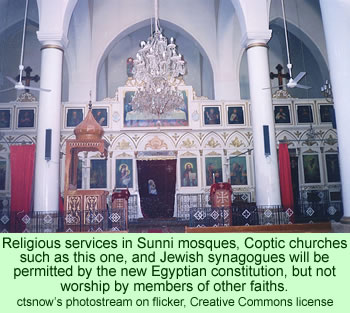Recent Nubian enthusiasm for the possibilities of changes in Egypt that will give them more rights may be a bit premature, to judge by the news last week. A prominent Nubian activist who has been a member of the Constituent Assembly, the group that is preparing a new national constitution, has resigned in disgust.
 Manal El-Teiby, the Nubian head of the Egyptian Centre for Housing Rights, was one of only two members of the Rights and Freedoms Committee in the Assembly to oppose a committee decision to restrict freedom of religion in the new constitution. There were 15 members on the committee in all.
Manal El-Teiby, the Nubian head of the Egyptian Centre for Housing Rights, was one of only two members of the Rights and Freedoms Committee in the Assembly to oppose a committee decision to restrict freedom of religion in the new constitution. There were 15 members on the committee in all.
The other 13 members, all Islamists, favored restricting religious freedoms. They passed a constitutional prohibition of the open practice of religious faith by such un-authorized groups as the Shias and the Baha’is. Sunni Islam, Christianity, and Judaism will be the only faiths allowed to practice openly in the new Egypt, although freedom of private beliefs will still be permitted.
El-Teiby issued a statement announcing her resignation, indicating that she had argued for the freedoms and rights of all Egyptian citizens, but she has lost that fight. Her argument for religious freedom “did not sit well with the majority that has a clear ideological basis and dominates the Constituent Assembly,” she said.
She also tried to have the phrase “ethnic or racial origin” added to the protected guarantees in the constitution of Egypt, but the other committee members thwarted that move. She indicated last week that her opponents in the constitution writing process had mounted a smear campaign against her. She cited an article published in the government news organ, Al-Ahram, that she says slandered her in its coverage of the controversy.
Ms. El-Teiby said that the committee is planning a trip to Aswan to discuss the hopes of the Nubian community for its rights and freedoms in the new constitution. She said that one member of the group had already traveled to Aswan ahead of the full committee and had spread the story that El-Teiby was an advocate of full independence for the Nubians from Egypt, an assertion that she denies.
Furthermore, she proposed other liberal ideas, such as rights to housing and health, suggestions that the majority on the committee either rejected or rewrote. El-Teiby resigned because she felt she could achieve none of the guarantees that she wanted.
U.S. Secretary of State Hillary Rodham Clinton, speaking in Washington on July 30th at the Carnegie Endowment for International Peace, mentioned her meeting with Egyptian President Mohamed Morsi two weeks earlier. She indicated that Egyptians are quite concerned about preserving their freedoms, especially their religious liberty.
“President Morsi has said clearly and repeatedly in public and private that he intends to be the president of all the Egyptian people,” she said. Ms. Clinton was, of course, speaking diplomatically, but it is really not clear from the news last week just how respectful the new Egyptian government will be to minority groups such as the Nubians.